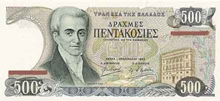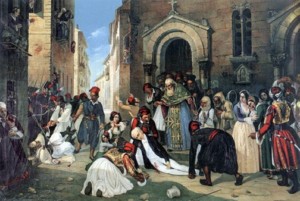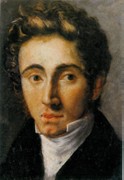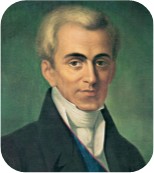JOHN KAPODISTRIAS
Count John Kapodistrias (1776-1831) was born on 11 February 1776 in the Ionian island of Corfu. He belonged to an ancient aristocratic Corfiote family, which had emigrated to Corfu from Istria in 1373. He studied medicine, philosophy and law in Italy.
At the age of 24 Kapodistrias became secretary of the Ionian legislative council. He listened to the voice of the Ionian people and the democratic changes he initiated were gladly accepted by them. This would prove a stark contrast to the reception he received for the changes he later made in Greece. At the age of 31 Kapodistrias was appointed military governor. He became famous throughout Greece when he successfully turned back Ali Pasha of Ioannina. During this period he met Theodoros Kolokotronis who greatly influenced the Greek nationalism and patriotism in Kapodistrias. Kolokotronis admired Kapodistrias’ diplomatic ability.
The political and ethical worth of Kapodistrias impressed foreign ambassadors. He was recruited by the Russians and was so successful that by the age of 39 he was the joint Foreign Minister of Russia. His success drew enemies in Austria and in the Russian court. These forces later joined to undermine Kapodistrias, accusing him of using Russian foreign policy as a weapon for Greek independence. He, therefore, took leave of the Czar and tried to capitalise on his international fame as a diplomat by working for the Greek cause from Geneva, Switzerland.
During the revolution Kapodistrias avoided becoming involved with the various political factions in Greece. He sought only to unite the Greeks. The Allied powers and the Greeks saw that Kapodistrias was a uniting force. On 6 April 1827 the Assembly, on Kolokotronis’ proposal, unanimously elected the 51 year old Count John Kapodistrias as President of Greece for a term of seven years. Kapodistrias accepted the nomination encouraged by the knowledge that he had the support of the Allies and the Greek nation. Kapodistrias travelled throughout Europe seeking financial support. He met the British Undersecretary of War who asked him, “what is Greece?” Kapodistrias answered:
“The Greek Nation is a Nation which never stopped its existence. Greeks after the fall of 1453 continued to speak the language of their fathers, which is the Greek language, and remained Orthodox under the protection of the Holy Church.”
When the same person had asked him what the borders of this Nation should be, he answered:
“The borders of Greece have been carved by those whose blood has been shed in massacres which took place at Kydonies, Cyprus, Mesolongi, Chios, Crete, Psara. Those borders have been defined by the ancient geographer Strabo. From Macedonia and Epirus to Crete and from Ionian islands to Asia Minor.”
On 6 July 1827 the Treaty of London was signed by the representatives of England, France, and Russia whereby Greece was to be autonomous under Turkish suzerainty. The Treaty was rejected by the Sultan who believed that he had effectively crushed the Revolution. On 20 October 1827, the Sultan’s fleets in Navarino were destroyed by the Allied powers.
Escorted by three Allied warships, Kapodistrias arrived in Nauplion, Greece on 19 January 1828 aboard HMS Warspite. On the following morning he attended a Thanksgiving Service at the Church of St George in the company of the Allied captains. Ibrahim still controlled nearly all the Peloponnese, continental Greece was almost entirely Turkish, and Crete had been brutally suppressed. The only territories acknowledging his authority was the city of Nauplion and a few Aegean islands such as Aegina, Poros, and Salamis. Upon seeking funds his Finance Minister told him, “The Treasury was not only empty, it was also non-existent.” The Greek citizens were in a desperate condition. There were no crops, as their fields had been destroyed over the seven years of the revolution, and no farm animals could be found. Starvation and destitution had reached epidemic proportions and the Greek people were desperate. Additionally, there were no schools, no hospitals, no teachers, no doctors, and no laws. Kapodistrias had to create a State from nothing.
One of the committees he established evaluated the state of the Orthodox Church in Greece. Of primary concern to Kapodistrias was its organisation, the theological and spiritual education of the priests, and the relationship of the Church of Greece with the Ecumenical Patriarchate – for which he saw the administrative responsibility in the former and the spiritual leadership in the latter, which remained in captivity.

He undertook many critical national actions, such as:
- persuading the National Assembly at Aegina on 30 January 1828 to transfer its powers for three months exclusively to himself to prosecute the war effort, undertake domestic reforms so Greece could be self-sufficient, and to negotiate the boundaries of Greece with the foreign European powers who wanted to exclude Crete and Samos;
- reorganising the army under Dimitrios Ypsilantis and Andreas Metaxas, whom he commanded to push the boundaries of Greece as far as possible and reconquer territory lost to the Ottoman military during the civil wars; • opening an orphanage in Aegina for war orphans; &
- dealing with England’s machinations to undermine him, and facing the hostility of local landowners who felt that their power was threatened by him.
The Mavromichalis family were not prepared to cooperate with a central organisation and refused to pay taxes to the Greek government. Despite their protests Kapodistrias had charged Petrobey Mavromichalis with high treason and imprisoned him for nine months without trial. On 9 October 1831 at the age of 55, Kapodistrias set out to attend an early morning church service at the Church of St Spyridon in Nauplion. As he walked towards the Church entrance Constantine Mavromichalis fired a concealed pistol from close range and George Mavromichalis stabbed Kapodistrias through the heart. Kapodistrias collapsed into the arms of his attendants. His one-armed body guard fatally shot Constantine who was soon after finished off by other body guards. The angry crowd threw his body into the sea. George was later captured and killed by firing squad. The death of the influential and much loved Kapodistrias was lamented by the majority of the Greek people. Kolokotronis in his memoirs wrote:
“When the people of Tripolis heard the terrible news they were struck dead. They abandoned their factories and their work, and walked aimlessly through the streets stunned with grief.”
The endearing characteristic of Kapodistrias was his pious Christian faith. Upon his arrival to Greece he attended a thanksgiving service. On his death, he was attending a Divine Liturgy service. On his description of the Greeks to the foreign powers, he emphasised that they never stopped confessing their Orthodox faith.

Earlier in 1819 Kapodistrias had written to his father that the historical existence of the Byzantine Greeks was fermented with faith. The fact that they were preserved at all is a result of the Greeks’ sincere petitions in tears, God’s divine providence, the intercessions of the Miracle working Saints and the Ever Virgin Theotokos. At another time Kapodistrias wrote, “the Christian religion preserved the Greeks and their language and the nation and the ancient glorious memories and granted to them again their national existence, which is their pillar of strength.” He linked the cause of the revolution not to the European powers and their assistance but to the continuing historical traditions of the nation and its spiritual reserves. As President he revealed to J.B. Georges Bory de saint Vincent: “firstly I am a Greek because I was born in this country, I am Greek from my father and my mother. I am Greek with the grace of God who bestowed upon me the governorship of this poor people. I am Greek from birth, from a clean heart, from the way I feel, from my responsibilities, and from my faith.”
We best understand John Kapodistrias when we examine his philanthropic acts, and enter into his faith. All of his fortune was given to the homeless and the orphans of his country. His life as a doctor and later as a diplomat was aimed at alleviating human misery. His actions were performed in a God-fearing and loving fashion. Everything he did was in recognition of the duty and responsibility bestowed upon him by God and in love for his fellow Greeks and the Greek nation. He established a sound Orthodox education in all schools to enable his compatriots to learn their faith and to thank God for preserving the Greek nation over the 400 year occupation. With the best intentions he attempted to assist the Orthodox Church of Greece to grow under the spiritual guidance of the Ecumenical Patriarch. His spiritual qualities and leadership skills are much admired and inspirational, and he has left an enduring legacy in the minds of the grateful Greek generations that have followed.
Source: Lychnos December 2021 / January 2022



